- Home
- Cynthia Hand
My Calamity Jane Page 10
My Calamity Jane Read online
Page 10
Now this was a topic Jane was squirrelly about. “Indian fighter” had never been a label she’d been terribly comfortable with (and one we as your narrators are terribly uncomfortable with), but if you wanted to be a famous adventurer in the Wild West, you were supposed to act like you’d spent half your free time “bravely fighting off the hostile natives.” (Which is pretty awful, considering that they were fighting the land’s rightful inhabitants.) Jane scratched at her head. “You heard about that, did you?”
“Yes, from you. You said you saved Captain Egan during a skirmish with the Sioux,” Annie reminded her.
“Oh. Right. Right.” Jane nodded. “Uh-huh. That’s right.”
“So what was it like?”
(The truth is, up to this point in her life Jane had never been in a skirmish with the Sioux. She had never actually met a Native American in person, let alone in any kind of combat. In her past adventures, as a scout or a driver, if Jane ever had reason to believe that an Indian was thereabouts, she’d turn right around and go quick as she could in the opposite direction.)
Jane used her sleeve to wipe her sweaty brow. “It was like fighting anybody else, I expect. You try to stay on the living side of things.”
Annie looked thoughtful. “My family are Quakers. We believe that what’s happening to the Native people in this country is wrong. Can you imagine, folks showing up unannounced at your house, saying it’s theirs now, and you’ve got to leave? And no matter where you go, that keeps happening, you’re forced from one place after another, starved and abused and set upon everywhere you go? It’s no wonder if some of them are angry.”
Jane frowned. She happened to have some experience in being forced from her home. “I never thought about it that way.”
“Well, you should,” said Annie.
“All right. I will.” Jane scratched the back of her neck and then changed the subject by showing Annie the rest of the animals: Bill’s donkey, Silver.
“He’s a lazy ass,” Jane said. “Puffs up his belly if you try to saddle him. He’ll stop moving every five minutes if you let him. Won’t go but the slowest of walks. Sleeps most all the time. I don’t know why Bill won’t sell him.”
“He’s cute,” said Annie.
They petted him for a few minutes in uncomfortable silence. Then Annie fished a small book out of her pocket. “I also wonder if you could tell me about the garou.”
Jane straightened in alarm. “Why would I know anything about garou?”
Annie cocked her head to one side. “Because you’re a garou—”
“No, I’m not!” burst out Jane.
Annie blinked at her. “I know you’re all garou hunters, you and Mr. Butler and Mr. Hickok and Mr. Utter.”
Jane folded her arms over her chest. “And how do you know that, exactly?”
Annie folded her arms, too. “I just do.”
Jane’s heart was beating fast. Yesterday Annie had said she had “proof” that their posse was still hunting garou. She’d acted like she herself was eager to hunt them. And now, as Jane happened to look at her hand, which was up by her face on account of her folding her arms, a tuft of fur sprouted from her right knuckle. She was changing. It wouldn’t be long now, and this could be her entire body. A hairy beast. Jane thrust her hand into her pocket.
“A-choo!” said Annie. “Oh dear.”
“Bless you!” Jane said. Then (and yes, we know she should have done this a lot sooner) she finally put two and two together. “Hey! It was you!”
“Me?” Annie looked at her with round blue eyes.
“At the factory! You were there! You were the one who kept sneezing!”
“Oh, that.” Annie pressed a handkerchief to her upturned nose. “Yes, that was me.”
“You almost got me killed!” Jane exclaimed, so loudly that Silver tossed his head and brayed.
“Well, yes, that’s true, but I also saved your life multiple times,” explained Annie. “It was I who shot Mr. Badd outside the office, not Mr. Butler.”
“Which is why Mr. Badd didn’t die,” Jane figured out slowly. “Because you didn’t shoot him with a silver bullet.”
“I didn’t know you needed a silver bullet to kill a garou,” Annie confessed.
Jane snorted. “Everybody knows that.”
Annie’s chin lifted. “Even if I had known, I don’t possess any silver bullets. And even if I did possess one, I wouldn’t have known to bring it along with me when I followed you that night.”
“Aha! So you admit you followed us that night!”
“Yes! I already said that!”
“And you almost got me killed! I change my vote,” said Jane hotly. “You’re not in the posse.”
Annie’s mouth fell open. “You can’t do that! I saved your life!”
“Did not! I would have been fine if you hadn’t shot that garou,” Jane retorted. She would have been more than fine, she thought. She would have gotten clear of the wolf some other way and never been bit. To Jane’s way of seeing, this was all Annie’s fault.
“I was also the one who turned on the machines when that second garou was trying to get you, providing a distraction at the crucial moment.” Annie’s dander was clearly up now. Her face was turning pink. Maybe pink. Jane’s eyes were acting up again. “So I saved your life twice, really.”
“You did not!” screamed Jane. Then: “Wait, what do you mean, that second garou?”
“Oh, you know.” Annie tilted her head to one side.
Jane did not know. “What are you talking about?”
Annie stifled a smile, obviously pleased that she had some new knowledge to impart. “There were two garou that night in the factory. Mr. Badd, and that other one who came from downstairs and attacked you.”
Jane stared at Annie. Then she grabbed the girl by the hand and started pulling her toward the exit. “I change my vote again. You can be in the posse.”
“Why, thank you,” said Annie. “Although I’m still only counting your original vote. You can’t change your vote. Where are we going?”
They reached the barn door, and Jane flung it open, revealing Frank standing there. He was wearing his dandiest suit, Jane noticed. He was also holding a bouquet of yellow flowers, and he’d put the fine smelly stuff in his hair. His gaze passed right over Jane and landed on Annie. He smiled, and Jane caught a whiff of mint.
“Good morning, Miss Mosey,” he said. “Fine day, isn’t it?”
“Yes, yes it is,” agreed Annie in a softer voice than she’d been using before. “How are you this morning, Mr. Butler?”
“Very well, thank you. Would you like to—”
“Stop! There’s no time for that!” yelled Jane. “We gotta go see Charlie!”
“I told you, Jane. Charlie’s fine,” Frank said as Jane pushed past him, still with Annie by the hand. “I saw him last night. He’s banged up, of course, but he was in good spirits.”
“We gotta tell him that there were two garou that night at the factory!” Jane kept walking, towing Annie behind her.
The flowers dropped from Frank’s hand. He jogged to keep up. “Two garou? Uh, I have absolutely no idea what you’re talking about.”
“There were two!” It was the second wolf who’d bitten her, Jane realized. “One of them got away!”
“Charlie!” Jane called as she, Annie, and Frank burst into the doctor’s house where Charlie had been convalescing for the past few days. “Charlie, wake up! We got news!”
Charlie, it turned out, was not asleep. He was sitting up in his bed, his wrapped leg stretched before him, looking pale and peaked, but not from his injuries. He was staring tensely at the open window (or outside of it, we should say), where there was a figure peering through at him. A boy, a few years younger than Frank, who seemed familiar to Jane.
It was one of the bitten factory workers, she realized. The boy with the bushy eyebrows. He was trembling and, from the looks of things, crying, even. Which didn’t make sense.
Because he was
holding a gun. And he was pointing it right at Charlie.
FOURTEEN
Frank
Frank held his hands out, palms down. “Hey, there,” he said, his voice cracking a bit, which was totally embarrassing in front of Annie, but that was definitely not what he should be focusing on right now. “What’s going on?”
Jane leaned over and said out of the side of her mouth, “What’s going on is he’s got a gun pointed at Charlie!”
Frank woooed softly, keeping his eyes on the boy. This was no time to lose his nerve. “You look frightened, which makes me think you don’t want to be doing this.”
“I have to,” the boy said in a shaky voice. His hands were trembling so violently that Frank was afraid the six-shooter would go off by accident.
“Why do you think you have to?” Frank kept his voice even, but his heartbeat was thunder in his ears. In the back of his mind, so far back it was most likely reflex at this point, he imagined all the things that kept him calm: wind in tall grass, the gentle dance of fireflies, and the sun sinking lower in the sky.
Tears streamed down the boy’s cheeks. “He said they would tell everyone I was a garou. And if that happens, no one will give me a job. My family will starve. I’m the only one able-bodied enough to earn money.”
“Who said that?” Frank asked.
The boy shook his head.
“I recognize you,” Frank said. He took a tentative step toward the window, and the boy flinched. Jane and Annie both flinched, too. “You were at the factory that night, right?”
The boy didn’t respond. He just shook.
“I think you were. I know you’re going through a very hard time right now.”
“A hard time? A hard time?” The boy howled in despair. “A week ago, I was normal. Now I’m a garou. My life is over. There’s no way to keep it a secret. My mother is a cripple. My father is gone. And I guess I’m about to commit murder.”
“Or, maybe, as an alternative, you don’t commit murder,” Frank said. He took another step. “You saw us at the factory. You know we’re the good guys.”
“Yeah,” Jane said. “We’re, like, the revengers.”
Frank’s heart was breaking for this boy. He was so scared, so young, and had no one to take care of him. “We can help you,” he said, soothingly. “But if you kill Charlie . . . well, there’s no coming back from that. And what’s to stop whoever from threatening you again?”
The boy’s shoulders slumped, and he lowered the six-shooter. Frank closed the distance and gently took the gun out of the boy’s hand. Without looking, he passed it behind him to Jane, who carried it out of reach.
“Come inside and talk to us,” Frank told the boy. “We’ll figure it out.”
The boy started to climb through the window.
“Oh,” Frank said, “I meant through the door— Oh, okay, you’re in.”
The boy sank into the chair in the corner of the room. Frank and Jane (sans six-shooter) went to his side. Annie stayed by the door.
“Who threatened you?” Frank asked.
“A man in a carriage. He stopped me on the street.”
“Did you know the man?” Frank asked.
The boy shook his head.
“Did you get a good look at him?”
“He was wearing a hat.”
“A hat?” Annie repeated. “What kind of hat?”
“One of those fancy hats. A top hat.”
Frank and Jane exchanged a look.
“Did you see his face?” Frank asked.
The boy shook his head. “It was too dark.”
Frank frowned. “I know it was dark, but hasn’t it been said . . . that . . . garou can maybe see really well in the dark?”
“I don’t know if that’s true,” the boy said.
“I think it sure sounds true,” Jane said.
“I was just so frightened. I didn’t even look at him.”
“Well, that makes it more difficult on our end,” Frank said. “Was he tall? Short?”
“I don’t know.”
Frank was beginning to think this boy wasn’t going to make a very good garou. He pulled some bank notes out of his pocket. “I’m betting this nondescript man happened upon you on the street and seized an opportunity. But I’m here to tell you that you can live a good life as a garou. You can learn to master it. It is not the end of your life.”
The boy pocketed the bills and nodded. “I guess I can try. Should I take the gun?”
Frank raised an eyebrow. “Uh, that’s a hard no. You can take the door on your way out, though.”
The boy shuffled toward the door, and Annie gave him a wide berth. He paused with his hand on the doorknob.
“The man did have a strange smell,” the boy said. “Like peppermint mixed with . . . moonlight.”
With that he left.
Annie looked incredulous. “You’re letting him go?”
Frank nodded. “Just because he was bitten doesn’t make him bad.”
“He almost murdered your friend.”
“He was scared,” Frank said. “The more pressing issue is who was at this factory turning all these people, to what end, and what the heck does moonlight smell like?”
Jane raised her hand. “Oh, oh, the reason we came here. There was a second garou at the factory.”
So she’d claimed before, but—
“How do you know?” Frank asked.
Jane scratched her chin. “Well, that’s a mite difficult to explain.”
“I was there and I saw everything and I shot the first garou,” Annie said. “But I did not shoot the second one.”
“So, maybe it’s not that difficult to explain,” Jane said.
“You were at the factory?” Bill’s voice came from the doorway.
“Yes.” Annie stepped aside to make room for him to enter.
“And to further catch you up,” Frank said, “one of the boys from the factory was blackmailed into trying to kill Charlie. We talked him down. The blackmailer wore a top hat, but the boy didn’t get any further description, except he smelled of peppermint and (ahem) . . . moonlight.”
At this Bill tilted his head. “There are a lot of things going on here.”
“I know,” Jane said. “Lots of threads. We’re not used to plots with any complexity.”
Bill looked at Charlie. “You feelin’ okay?”
Charlie nodded. “I mean, my leg hurts, and not five minutes ago there was a gun aimed at my head, but now we’re back down to just my leg hurting.” He gave a wry smile. “So yeah, I’m fine.”
Bill sighed. “I want to go check out a new lead.”
“What new lead?” Frank said.
“It’s not something that’s even worth talking about yet,” Bill said. “I’ll go at it on my own. Jane, look after the horses. Frank, you and . . . Annie”—at the sound of her name, Annie stood up straighter, as she always did—“go practice for the show.”
“Okay,” Frank said, standing straighter himself, because he had talked the boy out of killing Charlie and now he was going to practice sharpshooting with Annie, and ever since she’d beaten him in that contest . . . Well, let’s just say his heart had gone boom.
As they walked to their homemade shooting range behind the livery, Frank said, “I can’t believe you followed us to the factory. You’ve got to be more careful.”
“Oh, I was very careful as I shot that garou who was about to kill you.”
Frank was embarrassed to admit he felt relief that he hadn’t killed the garou. So he didn’t admit it.
“And I didn’t get so much as a thank-you,” Annie said with a grin.
Frank’s pulse started to race, and he wasn’t sure whether to attribute it to the fact that she’d saved his life or the fact he liked her smile.
“I’m so excited to be in the show,” Annie said as they reached the practice area. “Oh, George!”
George was dashing toward them. Frank crouched down to welcome him, but the poodle darted around him an
d leapt into Annie’s arms.
“Who’s a good boy?” she said.
Is it me? George thought.
“You’re a good boy.”
Yay! It’s me! George responded.
She set George down, and he immediately flipped over onto his back, exposing his belly for rubbing. Annie obliged, scratching him in just the right spot as to cause his left leg to twitch.
Up until now, George had only done the leg-twitch thing with Frank. But Frank wasn’t jealous. Because George was a dog and Frank was a man and man had no reason to resent dog and George was like a brother and he was most loyal and why did he like Annie better than Frank?
But then Frank looked at Annie. She was wearing another simple, formfitting dress, with a matching bow in her hair and buckled shoes that boasted a recent shine job. Of course George had leapt into her arms. Right now, Frank wanted to leap into her arms.
Annie stood up and ran her hand over her skirt, even though Frank couldn’t see one darn wrinkle.
They stared at each other in silence, Annie with a half smile and Frank with a full smile.
“Shall we begin?” Annie said.
“Gosh, sure,” Frank said articulately.
They spent the next few hours coming up with a routine for Annie’s act in the show.
“That’s enough warm-up,” Annie said when they were done. “Let’s start the competition portion of the afternoon.”
Frank considered this to be the best first date in the history of first dates. “How will we keep track of the score?” he said. “Should we make notches in that tree?”
“No need to harm a tree,” Annie said. “Let’s keep track another way. How about if each time one of us can’t copy a shot, we get a letter of a word. And when one of us, mostly you, finishes spelling the word, he—or she, but mostly he—loses.”
Frank chose to ignore her hubris on account of she was just so darn likable.
“What word shall we use?” Frank asked.
“Um . . .” Annie glanced at the stables. “How about horse?”
And thus, dear readers, the very first game of H-O-R-S-E was played. Of course, now the game uses trick basketball shots instead of trick gun shots, and this change is probably a good thing, because no one was as good at shooting as Frank and Annie, and therefore if other people tried to replicate the game, there would be blood.

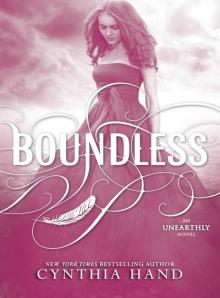 Boundless
Boundless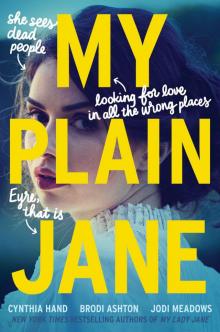 My Plain Jane
My Plain Jane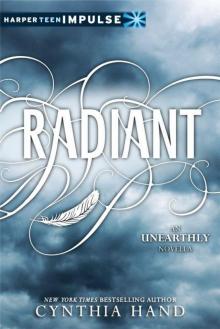 Radiant
Radiant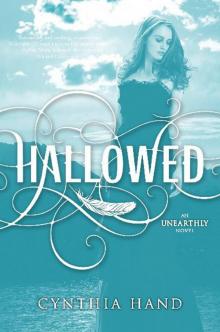 Hallowed
Hallowed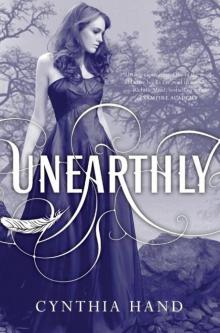 01 Unearthly
01 Unearthly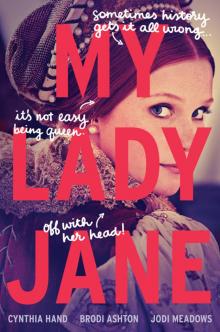 My Lady Jane
My Lady Jane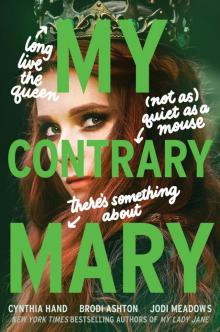 My Contrary Mary
My Contrary Mary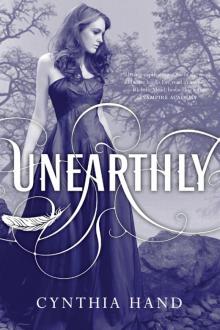 Unearthly
Unearthly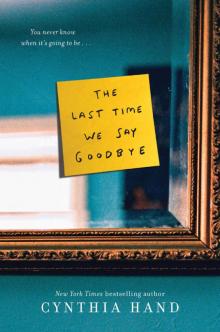 The Last Time We Say Goodbye
The Last Time We Say Goodbye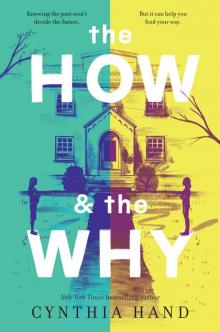 The How & the Why
The How & the Why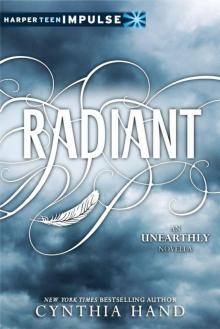 Radiant (HarperTeen Impulse)
Radiant (HarperTeen Impulse)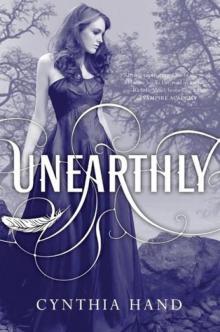 Unearthly u-1
Unearthly u-1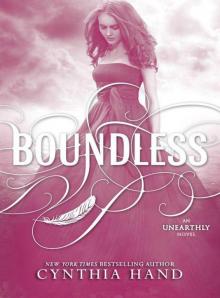 Boundless (Unearthly)
Boundless (Unearthly)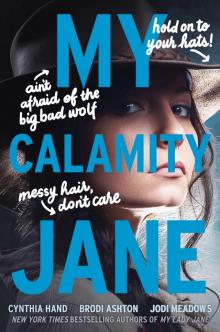 My Calamity Jane
My Calamity Jane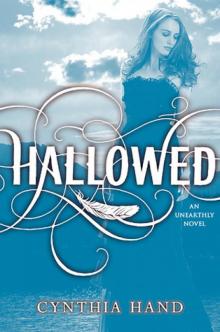 Hallowed u-2
Hallowed u-2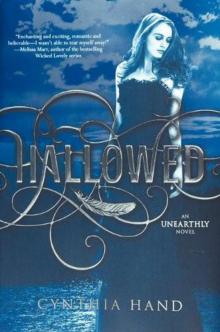 Hallowed: An Unearthly Novel
Hallowed: An Unearthly Novel